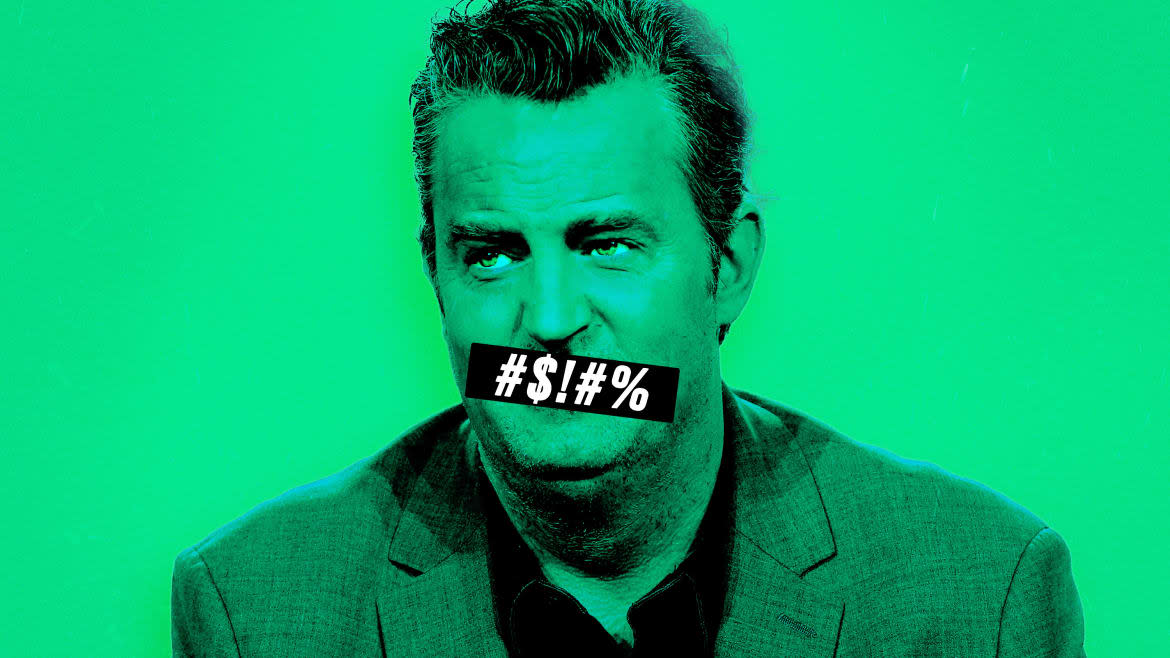Keanu Reeves Isn’t the Only One Matthew Perry Offended Recently

It’s not every day you see ostomy bags mentioned in entertainment news stories from the likes of People and The New York Times, so imagine my surprise last weekend when I saw those outlets and more (including The Daily Beast) pick up a story about Matthew Perry revealing that he lived with a temporary colostomy for nine months. “Oh, wow!” I thought, “A celebrity talking about having an ostomy? Maybe stars really are just like us.”
But my enthusiasm dwindled pretty quickly when I read Perry’s comments about his “hellish” ostomy experience (perhaps only the second-most controversial piece of Perry news this week, after his perplexingly bitter feelings toward Keanu Reeves). And I wasn’t the only one, as his words have spread like fire around the ostomy community, leaving people feeling annoyed at best and offended at worst.
There are two angles @TheSun could have gone with for this story, that #stoma surgery helped save his life, or the one they went with, that he was 'forced' to have a colostomy. Shows there's a long way to go still to change perceptions. https://t.co/1wgGXaYOPz
Be #StomaAware— ColostomyUK (@ColostomyUK) October 21, 2022
As Perry recounted to People in a piece previewing his upcoming memoir, his colon burst in 2019 from years of opioid abuse. He spent two weeks in a coma before waking up and discovering that he’d had emergency ostomy surgery—which involves getting a surgically created opening called a stoma on the abdomen, allowing waste to leave the body—to save his life.
“I woke up and realized I had a colostomy bag,” the Friends star recalled. “They said, ‘It’s all too messy down there. We can’t do surgery. But in about a year, you can reverse that.’ It was pretty hellish having one because they break all the time.”
He further said that it was having an ostomy that helped him finally break his long pattern of addiction. He told People: “My therapist said, ‘The next time you think about taking OxyContin, just think about having a colostomy bag for the rest of your life.’”
Some outlets that aggregated Perry’s story framed it more responsibly than others. The New York Post wrote, “The frightening experience and sight of a colostomy bag were what ultimately did it for Perry,” as if those of us with stomas are akin to ghoulish Halloween decorations that inspire fear, instead of normal-looking people and even actual models. Page Six went with: “How Matthew Perry’s ‘hellish’ colostomy helped him kick his drug addiction.” Even People framed it questionably in its own headline, writing that Perry “recovered from his colostomy”—a strange choice of words, considering a colostomy is not something you “recover” from.
Give Ariana Grande an Oscar for Her ‘Best in Show’ Halloween Tribute
“It’s exceedingly inaccurate,” Glenda Hamburg, a Los Angeles-based wound ostomy nurse for over 30 years, said about People’s headline. “You don’t recover from a colostomy. A colostomy is simply a procedure to save your life. You can recover from drug addiction; that’s a whole other thing entirely. What he should have said is that he was able to stop taking drugs after he almost died, and the colostomy saved his life.”
Following the circulation of Perry’s story, many people in the ostomy community took umbrage with the actor (and his therapist) painting an ostomy as a worst-case scenario and the last thing you’d ever want to have. Such comments, many ostomates argued, bolster negative stigmas and stereotypes.
James Murray, the president of United Ostomy Associations of America (UOAA), issued a written statement addressing the potentially harmful way Perry framed his experience.
“While it’s wonderful that Perry has fought to end his addiction, these words sting for those of us who deal with the consequences of ostomy stigmas in our society… Despite the fact that ostomy surgery saves or improves lives, there are still people who believe that death is a better choice than having this surgical procedure. People of all ages struggle with body image issues and acceptance in life with an ostomy and perpetrating these stigmas can leave deep scars,” Murray wrote.
Also concerning was Perry’s hyperbolic comment that ostomy bags “break all the time.” Bags leak sometimes, but that’s not considered normal, especially for people who receive (and engage with) the proper education and resources surrounding stoma care. It’s obvious that Perry, for whatever reason, was not able to adapt well to having an ostomy. Certainly some people struggle with leaks, irritated skin, hernias, or blockages, all of which can leave ostomy patients traumatized—even the rich and famous ones. But saying that they “break all the time” really makes it seem like living with a bag is just one long nightmare, and one can’t help but wonder if, with the right time and support, Perry would have been able to better manage his colostomy.
That being said, I certainly don’t begrudge anyone for feeling negatively about having an ostomy because the truth is, it can really suck. I was 19 when I got my first ileostomy, following an emergency surgery to get my colon removed because of complications from Crohn’s disease. I was able to get a reversal surgery almost two years later—an option that is not always available to everyone—and I was thrilled about that. I hated having my stoma during what I thought would be my “fun college years,” and my resentment toward it manifested through disordered eating habits, depressive thoughts, and anxiety.
When I had to get an ileostomy again in August 2021 at age 30—this time because of a pesky, painful rectovaginal fistula—I was able to see things with a different perspective; one that I think came from simply being older and more mature. I realized what many ostomates already know: that you can live an awesome, full life with an ostomy. In the past year, I’ve run two marathons, including the Boston Marathon, with my bag. Other ostomates I know have had babies and gone scuba-diving. We’re not as limited as you might think; many of us can hike, swim, surf, have sex, wear bikinis, and play sports just like anyone else.
People who read Perry’s comments, however, might not realize those things are possible, and may instead equate the surgery with a death sentence. I worry about someone who may be faced with getting an ostomy one day and thinks it’ll ruin their life because the only thing they know about it is that Chandler from Friends had one and told People magazine how “hellish” it was. It’s a worrying message, and one that’s especially frustrating when you consider that Perry could have described his experience honestly while also acknowledging that the thing he hated so much was also the thing that saved his life.
“That alone is enough to make people think twice about whether they should have a colostomy, if they have a choice in the matter. They’re going to have a very negative attitude toward it, even though it might save their life,” Hamburg told The Daily Beast about Perry and his therapist’s comments. “He didn’t couch it in the fact that he was lucky because they could do something like this in a temporary situation so that he could survive, so that his body could heal, so that he could recover. He couched it in a very negative way, including actually kind of attributing his sobriety to having had a colostomy. It puts a very negative light on the concept of having a colostomy and the fact that it wasn’t done to make him see that he needed to change his ways. It was done to save his life.”
At the same time, it’s a nuanced issue for a host of reasons, including that Perry’s negative experience with his colostomy may be compounded by feelings of shame. As he told People, his colon burst because of years of opioid use, and it’s clear he has some regrets about his past drug addiction. I don’t pretend to understand the emotional and physical issues surrounding his battle with addiction and subsequent recovery, and I’m glad he found sobriety in whatever way he could. But I do wish the framing of his story had been different, because his comments perpetuate the myth that ostomies are purely and solely a negative outcome. In reality, ostomies can vastly improve the quality of life for people like myself who have our bags because of a disease like Crohn’s or ulcerative colitis that made us feel chained to the toilet during painful flare-ups. Certainly no one wants to deal with those kinds of serious health issues—or birth defects, cancers, injuries, or any of the other many reasons a person might need an ostomy—but when and if you’re faced with them, it’s a relief to know that there are effective surgical interventions that can give you some semblance of a normal life.

A closeup of the ostomy port on the tummy of Jessica Grossman, 25, who had Crohn's disease as a child.
Ultimately, I think the irritation toward Perry from the ostomy community stems from the simple fact that ostomies are not widely discussed in the media whatsoever, and this was a rare opportunity to get it right and to not feed into the poor perception most people have of them. There are up to 1 million people in the U.S. who live with a stoma or incontinent diversion, according to the UOAA, but a lot of people still don’t know what an ostomy is. The notion, therefore, that a stoma is the worst thing anyone can endure has more to do with the general public’s stigmas surrounding ostomies as disgusting and something to be avoided at all costs, like Perry’s therapist apparently suggested. I know from experience that people imagine all sorts of gruesome and gross things about ostomy bags (cue all the “bag of shit” jokes) because there’s just not a lot of education around them. Not to mention, having an ostomy makes you different from most people, and no one wants to be seen as unusual or “flawed” by society’s standards. It’s hardly a glamorous image; certainly not very “Hollywood.”
In that sense, it would have been nice for a celebrity with a big platform to help squash the stigma of having an ostomy instead of pushing it forward, like Perry unfortunately (and, I can imagine, unwittingly) did here. And it’s not just him; the news outlets that regurgitated his quotes were complicit too. The way we frame stories about people’s disabilities matters, and in this case, it should have been handled with more care and less of an eye toward sensationalism.
At the very least, hopefully this will prompt more conversation and education around ostomies—which, I assure you, are not as “hellish” as you might’ve believed.
Get the Daily Beast's biggest scoops and scandals delivered right to your inbox. Sign up now.
Stay informed and gain unlimited access to the Daily Beast's unmatched reporting. Subscribe now.

 Yahoo News
Yahoo News 
